数词介词的用法图文稿
- 格式:docx
- 大小:59.11 KB
- 文档页数:21
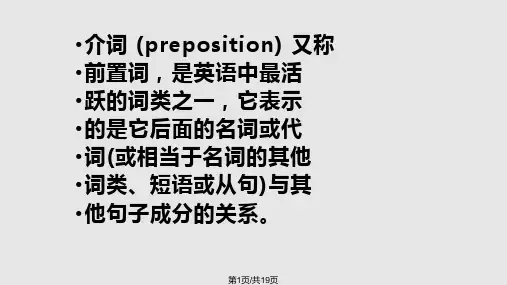
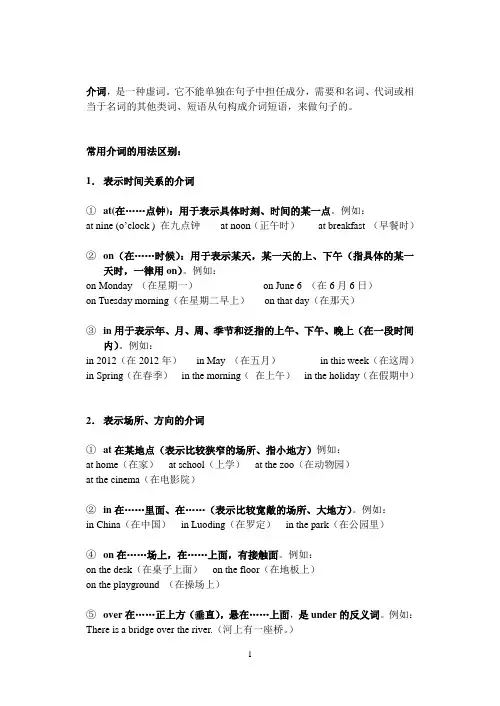
介词,是一种虚词。
它不能单独在句子中担任成分,需要和名词、代词或相当于名词的其他类词、短语从句构成介词短语,来做句子的。
常用介词的用法区别:1.表示时间关系的介词①at(在……点钟):用于表示具体时刻、时间的某一点。
例如:at nine (o’clock ) 在九点钟at noon(正午时)at breakfast (早餐时)②on(在……时候):用于表示某天,某一天的上、下午(指具体的某一天时,一律用on)。
例如:on Monday (在星期一)on June 6 (在6月6日)on Tuesday morning(在星期二早上)on that day(在那天)③in用于表示年、月、周、季节和泛指的上午、下午、晚上(在一段时间内)。
例如:in 2012(在2012年)in May (在五月)in this week(在这周)in Spring(在春季)in the morning(在上午)in the holiday(在假期中)2.表示场所、方向的介词①at在某地点(表示比较狭窄的场所、指小地方)例如:at home(在家)at school(上学)at the zoo(在动物园)at the cinema(在电影院)②in在……里面、在……(表示比较宽敞的场所、大地方)。
例如:in China(在中国)in Luoding(在罗定)in the park(在公园里)④on在……场上,在……上面,有接触面。
例如:on the desk(在桌子上面)on the floor(在地板上)on the playground (在操场上)⑤over在……正上方(垂直),悬在……上面,是under的反义词。
例如:There is a bridge over the river.(河上有一座桥。
)冠词、数词冠词要用在名词前面,用来说明名词所指的人或事物是泛指还是特指。
冠词是一种虚词,不能单独作句子成分。
冠词分为不定冠词a/an和定冠词the。
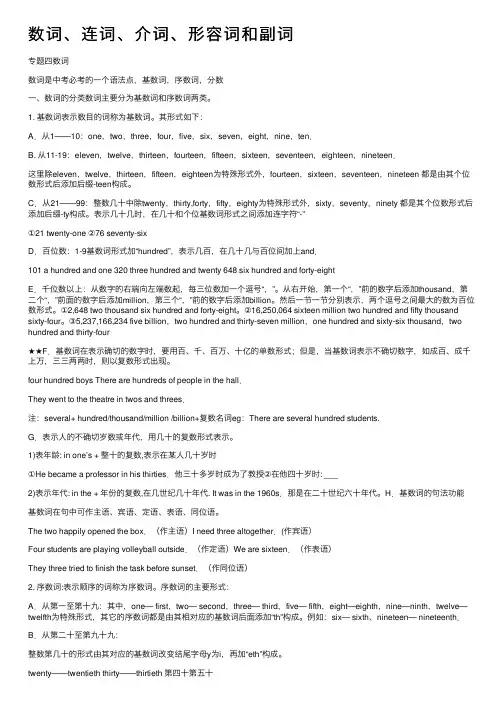
数词、连词、介词、形容词和副词专题四数词数词是中考必考的⼀个语法点,基数词,序数词,分数⼀、数词的分类数词主要分为基数词和序数词两类。
1. 基数词表⽰数⽬的词称为基数词。
其形式如下:A.从1——10:one,two,three,four,five,six,seven,eight,nine,ten.B. 从11-19:eleven,twelve,thirteen,fourteen,fifteen,sixteen,seventeen,eighteen,nineteen.这⾥除eleven,twelve,thirteen,fifteen,eighteen为特殊形式外,fourteen,sixteen,seventeen,nineteen 都是由其个位数形式后添加后缀-teen构成。
C.从21——99:整数⼏⼗中除twenty,thirty,forty,fifty,eighty为特殊形式外,sixty,seventy,ninety 都是其个位数形式后添加后缀-ty构成。
表⽰⼏⼗⼏时,在⼏⼗和个位基数词形式之间添加连字符“-”①21 twenty-one ②76 seventy-sixD.百位数:1-9基数词形式加“hundred”,表⽰⼏百,在⼏⼗⼏与百位间加上and.101 a hundred and one 320 three hundred and twenty 648 six hundred and forty-eightE.千位数以上:从数字的右端向左端数起,每三位数加⼀个逗号“,”。
从右开始,第⼀个“,”前的数字后添加thousand,第⼆个“,”前⾯的数字后添加million,第三个“,”前的数字后添加billion。
然后⼀节⼀节分别表⽰,两个逗号之间最⼤的数为百位数形式。
①2,648 two thousand six hundred and forty-eight。
②16,250,064 sixteen million two hundred and fifty thousand sixty-four。
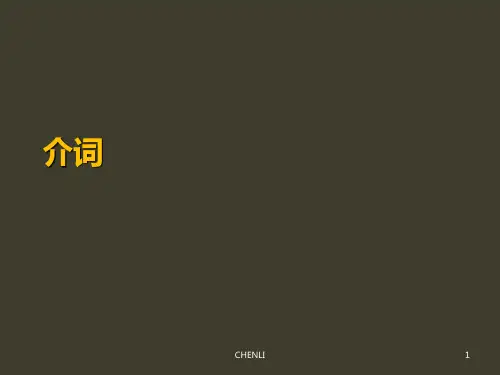
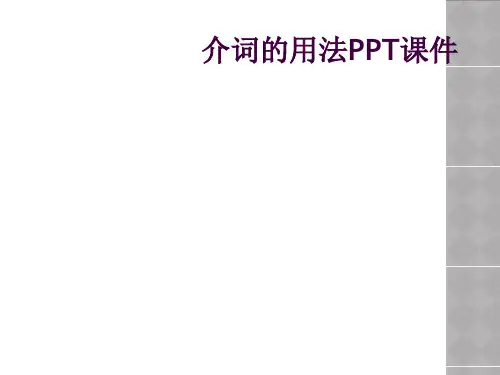
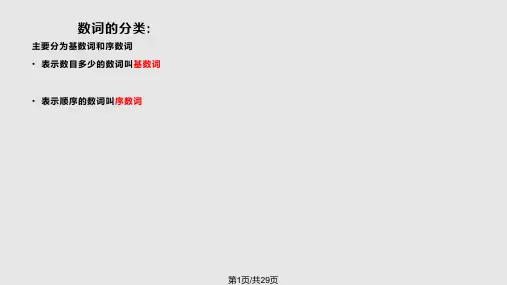
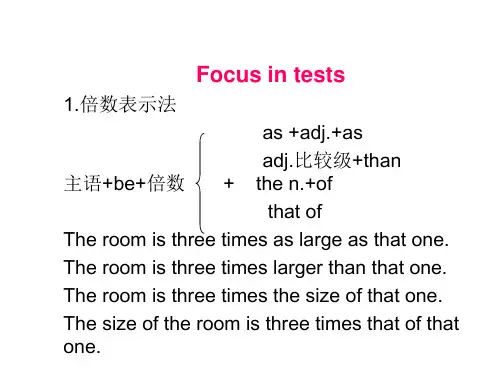
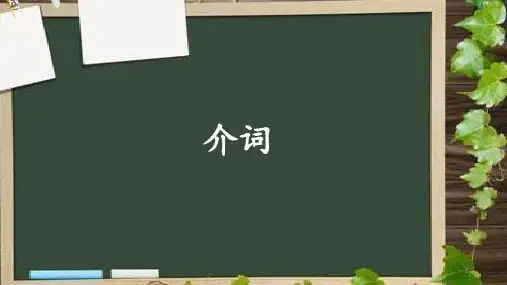
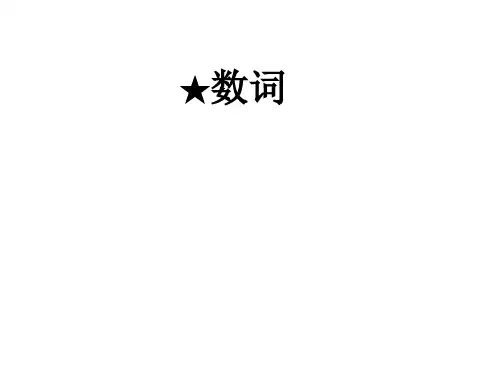
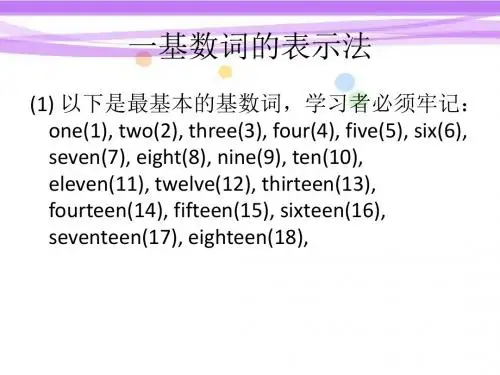
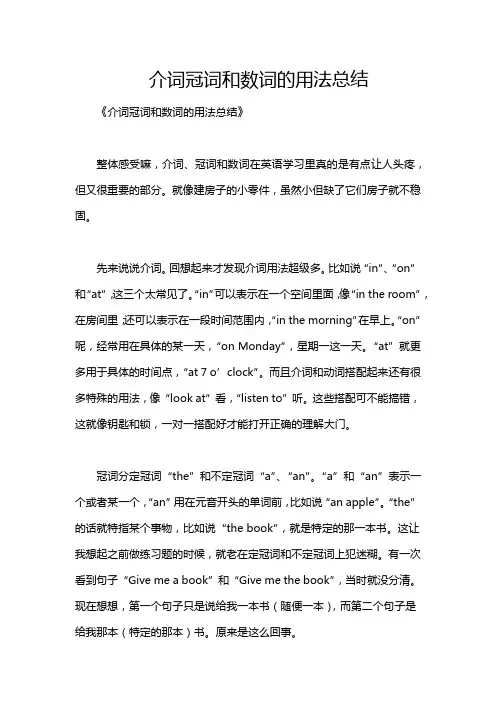
介词冠词和数词的用法总结《介词冠词和数词的用法总结》整体感受嘛,介词、冠词和数词在英语学习里真的是有点让人头疼,但又很重要的部分。
就像建房子的小零件,虽然小但缺了它们房子就不稳固。
先来说说介词。
回想起来才发现介词用法超级多。
比如说“in”、“on”和“at”,这三个太常见了。
“in”可以表示在一个空间里面,像“in the room”,在房间里;还可以表示在一段时间范围内,“in the morning”在早上。
“on”呢,经常用在具体的某一天,“on Monday”,星期一这一天。
“at”就更多用于具体的时间点,“at 7 o’clock”。
而且介词和动词搭配起来还有很多特殊的用法,像“look at”看,“listen to”听。
这些搭配可不能搞错,这就像钥匙和锁,一对一搭配好才能打开正确的理解大门。
冠词分定冠词“the”和不定冠词“a”、“an”。
“a”和“an”表示一个或者某一个,“an”用在元音开头的单词前,比如说“an apple”。
“the”的话就特指某个事物,比如说“the book”,就是特定的那一本书。
这让我想起之前做练习题的时候,就老在定冠词和不定冠词上犯迷糊。
有一次看到句子“Give me a book”和“Give me the book”,当时就没分清。
现在想想,第一个句子只是说给我一本书(随便一本),而第二个句子是给我那本(特定的那本)书。
原来是这么回事。
数词相对来说比较简单,但容易出错的点也有。
基数词就是表示数量,“one”“two”“three”之类的。
序数词表示顺序,像“first”“second”“third”。
这里有个特别要记住的点,序数词前面一般都是要加定冠词“the”的,比如说“the first day”第一天。
重要发现呢,就是这些词的用法有时候是要根据上下文来判断的。
不能只看单词本身就确定怎么用,一定要把整个句子或者段落的意思弄明白。
反思一下,之前对于它们的学习有点太死记硬背了,没有深入去理解每个用法背后的逻辑。
数词介词的用法集团文件发布号:(9816-UATWW-MWUB-WUNN-INNUL-DQQTY-代词用法详解(人称代词)人称代词主格:作主语,表示谁怎么样了、干什么了。
I am a teacher.You are student.人称代词宾格作宾语,表示动作行为的对象,一般放在动词后面。
Give it to me.巩固训练用所给代词的正确形式填空。
1. These are ______ ( he ) brothers.2. That is _______( she ) sister.3. Lily is _______ ( Lucy ) sister.4. Tom, this is _____ ( me ) cousin, Mary.5. Now _____________(her parent) are in America.6. Those __________ ( child ) are _____ ( I ) father’s students.7. Do you know ______ ( it ) name?8. Mike and Tom __________ ( be ) friends.9. Thanks for helping ________( I ).10. ______(Ann安)mother is ______(we) teacher.物主代词:形容词性物主代词(my/your/his/her/its/our/their)+名词而名词性物主代词(mine/yours/his/hers/its/ours/theirs则相单于形容词性物主代词+名词,故其后不必加名词。
如:Is this your book No, it isn’t,it’s hers(her book) ,Jim’s ,Tom’s,Maria’s1.补全对话----Whose bike is it Is it______(your/yours)----No, it’s not______.(my/mine) _______is red. But this bike is blue .----Is it Jane’s----Sorry, I don’t know. Maybe it’s_______(her/hers).----Jane,is this______bike (youryours)----No,it’s not______.(my?mine) You can ask Bill(男人名).Maybe it’s________.(him/his)----Bill,is this bike_______----Oh,yes,it’s_______bike. Thank you very much!2. 填入正确的人称代词和物主代词1.Thisisn’t________knife._________isgreen. ( she )2.Theseareyourbooks,Kate.Put__________inthedesk,please. (they )3._______mustlookafter________things. ( you )4.WeiFang,isthat________rulerYes,it’s.( you )5.Theywantafootball.Give__________thegreenone,please.( they)6.It’sLinTao’sbag.Giveitto__________. ( h e )7.Isthispencil-boxLiLei’sNo,___________isverynew. ( he )8.Thisboxistooheavy.Ican’tcarry_________.( it )Don’tworry,Let__________( I )help__________. ( you)9._____isaboy_____nameisMike.Mike’sfriendslike_____verymu ch. ( he )10.Mysisterisin_____room._____isateacher. ( she )11.Janeisalittlegirl._____motherisanurse. ( she )12.Wearein_____classroom._____classroomisbig. ( we)13.Myfatherandmotherareteachers._____arebusy ( them)数词表示"多少"和"第几"的词叫数词。
其用法相当于名词或者形容词。
数词分为基数词和序数词两种。
基数词 1-12 是独立单词,需逐个记忆。
基数词13 - 19是个位数词的词干后加-teen 构成。
其中 thirteen, fifteen, eighteen变化不规则。
基数词20 ━90 是在十位数词后面加 -ty 构成。
基数词 21 ━ 99 是在十位数词后面加上个位数词合成,中间加上连字符 " - "; 基数词三位以上的数词, 在百位和十位之间,一般要用连词"and "。
例如:21 twenty –one 95 ninety - five132 one hundred and thirty-two 1340 one thousand three hundred and forty表示"万"的词英语中没有。
如1万可用10千来表示。
ten thousand30万可用 three hundred thousand 来表示。
注意:基数词one, two, three等与hundred, thousand, million, billion连用时hundred, thousand, million, billion后不加s, 如:two hundred, five million; 当不确定数词some, many与hundred, thousand, million, billion连用时hundred, thousand, million, billion后要加s,且后接of, 如:hundreds of; thousands of; millions of; billions of。
2.序数词:表示数目顺序的词用序数词。
1) 序数词1━19 除第一,第二,第三,第五,第八,第九, 第十二变化不规则外,其余均在基数词后加上 -th。
2) 十位整数的序数词的构成方法是将十位整数基数词的词尾 -y 变成i 再加 -eth。
3) 几十几的序数词,只是把个位数变成序数词,十位数不变。
4) 第一百以上的多位序数词,由基数词的形式变结尾部分为序数词形式来表示。
one hundred and twenty-first 第一百二十一one thousand,three hundred and twentieth 第一千三百二十5)序数词的缩写形式:有时,序数词可以用缩写形式来表示。
主要缩写形式有:first—lst second—2nd third—3rd fourth—4thsixth—6th twentieth—20th twenty-third—23rd其中lst,2nd,3rd为特殊形式,其它的都是阿拉伯数字后加上th。
6)序数词前往往要用定惯词“the”。
The second is what I really need.第二个是我真正需要的。
We are to carry out the first plan.我们将执行第一个计划。
注:序数词在使用时,通常前面要加定冠词 the;但是如果序数词前出现不定冠词a或an时,则表示“再——”,“又——”。
We'll go over it a second time.我们得再念第二遍。
7)基数词也可以表示顺序。
只需将基数词放在它所修饰的名词之后(名词需大写) 即可,不需要添加定冠词。
the first lesson——Lesson One the fifth page——Page 5(five)the twenty-first room——Room 21(twenty-one)3.数词的特殊用法1) 加减乘除的表达One plus two is three. 一加二等于三。
Eight minus four is four. 八减四等于四。
Two times two is four. 二乘二等于四。
Ten divided by two is five. 十除以二等于五。
2) 表示倍数This river is two times longer than that one. 这条河比那条河长两倍。
3) 表示百分数Thirty percent of them is water. 它们当中有30%的水。
Eighty percent of what he said is true. 他的话有80%是真实的。
4) 表示分数时,分子数字用基数词, 但分母要用序数词, 如分子不是1,序数词要用复数形式。
One fifth of the books are mine. 五分之一的书是我的。
Three-tenths of water is disappeared. 十分之三的水不见了。
5) 小数5.5 读作five point five 12.135读作 twelve point one three five专项练习:( )1. There are days in a year. A. threehundreds sixty-five B. three hundreds andsixty-five C. three hundred and sixty-five D. three hundred and sixty five( )2.He always wanted to have of books and he has recently bought four .A. hundreds...hundredsB. hundred...hundredC. hundreds...hundredD.hundred...hundreds( )3. Look! There are in the sky.A. thousand starsB. thousand of starsC. thousands of starsD. thousands of star( )4. He will come here tomorrow morning.A. at fifthB. at tenC. ontwo D. till tenth( )5. He began to live there .A. on his fiftyB. at age of fiftyC. when he fiftyD. in his fifties( )6. There are months in a year. December isthe month of the year.A. twelve; twelveB. twelve; twelfthC. twelfth; twelveD. twelve; twelveth( )7. Sunday is the day of the week.A. seventhB. firstC.second D. third( )8. What's the date today---It’s .A. FridayB. time to goC.cloudy D. June 4th( )9. Jenny was born .A. on July 10, 1987B. inJuly 10, 1987C. in 1987, July 10D. on1987, July 10( )10. About of the books in our school libraryare written in Chinese.A. four-fifthB. four-fifthsC.fourth-fifths D. fourths-fifth( )11. of the world's books and newspapers arewritten in English.A. Three quartersB. Three quarterC.Thirds four D. Threes fourth( )12. Tom is in the row.A. a secondB. the secondC. twoD. second( )13. I’ve been Hainan twice. I want to go theretime. A. the others B. a third C.other D. the third( )14. of the students are girls in our class. A.Two three B. Two threes C. Two thirds D.Second three介词1.about1)关于,对于 I know nothing about it.2)大约,左右 She is about 60 years old.3)在……周围 There are many trees about the lake.2.above1)位于……的上方 They live in a flat above the shop.2)超过,多于Today’s temperature is 12℃ above zero.3.across1)穿过,超过 He swam across the river.2)在……的对面 The bus stop is across the road.4.after1)在……之后,在……以后 We will talk about the matter after dinner.2)在……后面,模仿,按照 Read after me.The children went into the office after the teacher.5.along 沿着,顺着 We walked along the bank of the river. 6.among在……(三者或三者以上的)中间,在……当中He is the tallest among these the boys. The village is among the mountains.7.around1)在……的范围内,在……的各处 They showed us around the factory.2)在……周围(同round,),围着 They sat around the fire. 8.at1)在(较小的范围) The post office is at the corner of the street.2)(表时间或时候)在 The film began at seven thirty.3)对……,向…… The manager is shouting at him.Mother always looks at me with love in her eyes.4)在……方面 He is good at English.9.as 作为 He works as a worker in that factory.10.before1)(位置)在……前面 He stood before me.2)(时间)在……之前 We usually get up before six in the morning.11.behind1)(位置)在……后面 There is a garden behind the house.2)迟于,晚于, The train was behind the time.12.beside在……旁边 He sits beside me.13.besides除……之外(还) I have got several other friends besides you.14.by1)被……,由…… The story was told by one of my friend.2)在……旁边,靠近 My house is by the river.3)从……旁经过 We went by him.4)乘坐,骑 He often goes to school by bus.5)以……为手段,按照 He makes a living by selling newspapers.What time is it by your watch? 15.down 沿着……往下,顺……而下,向下Tears ran down her face. The boy ran down the mountain.16.during 在……期间 It rained a lot during this month. 18.for1)为了 He did it only for money.2)由于,因……原因 Yantai is famous for its apples.3)对……来说,就……而言 The weather is quite warm for December.The medicine is good for you.4) 表距离和时间的长短 I have learned English for ten years.They walked for ten kilometers. 19.from1)(表地点)从……起,由…… He came here from America.2)(表时间)从……开始 They will stay here from July to September.20.in1)在……内,在……里 China is in Asia.2)在 It is not cold here in winter.3)穿着 She was dressed in blue.4)用语言(工具,材料)Please write in English.Don’t write in pen; please write in pencil. 21.Inside 在……里面,到……里面 There are many buildings inside the city.Let’s go inside the room. 22.into1)进入 I saw him go into the shop.2)成为,变为 Water has been turned into ice.23.Like 像,和……一样 The boy looks like his father. 24.near1)在……附近,靠近,在……旁边 They live in a house near the park.2)接近,相近 It is near Christmas.25.Of ……的 This is a map of China.26.Off 从……离开,脱离 He fell off his bike last week. 27.on1)在……上面 There are some books on the table.2)在(某日,某日的上午、下午、晚上)My uncle arrived in Shanghai on Saturday morning.3)在……旁,紧靠 The old man on the left in the picture is my grandfather.4)关于,论述 This is a book on radio.28.Over 1)在……之上 The plane is flying over the city.2)遍及,在……各处 The news spread all over the country.3)超过,越过 There were over 1,000 people in the hall.29.Through 1)通过,穿过 They walked through the forest. 2)由于,通过 We often learn English through TV.30.To 1)朝,向,到 We went to the post office.2)给,对 Please give it to me.3)比 The score was ten to eight.4)(表目的、对象、结果、归属、感情等)To our surprise, the train was late for five hours. 31.under在……下面What’s under the table.32.up向上,沿……而上 The cat climbed up the tree.33.With 1)和,和……一起I’ll go with you.2)用(工具、方法、材料) We see with our eyes, and hear with our ears.3)带有,具有 Do you know the girl with long hair?4)随着,伴着 Weather changes with the seansons.5)由于,因为 We were wild with joy at the news.34. at, on, in 表时间的区别:1) at表某一时间点或年龄at 6:30, at nine o’clock, at night, at noon,2) on 用于某一天或某一天特定的早晨、下午、或晚上。